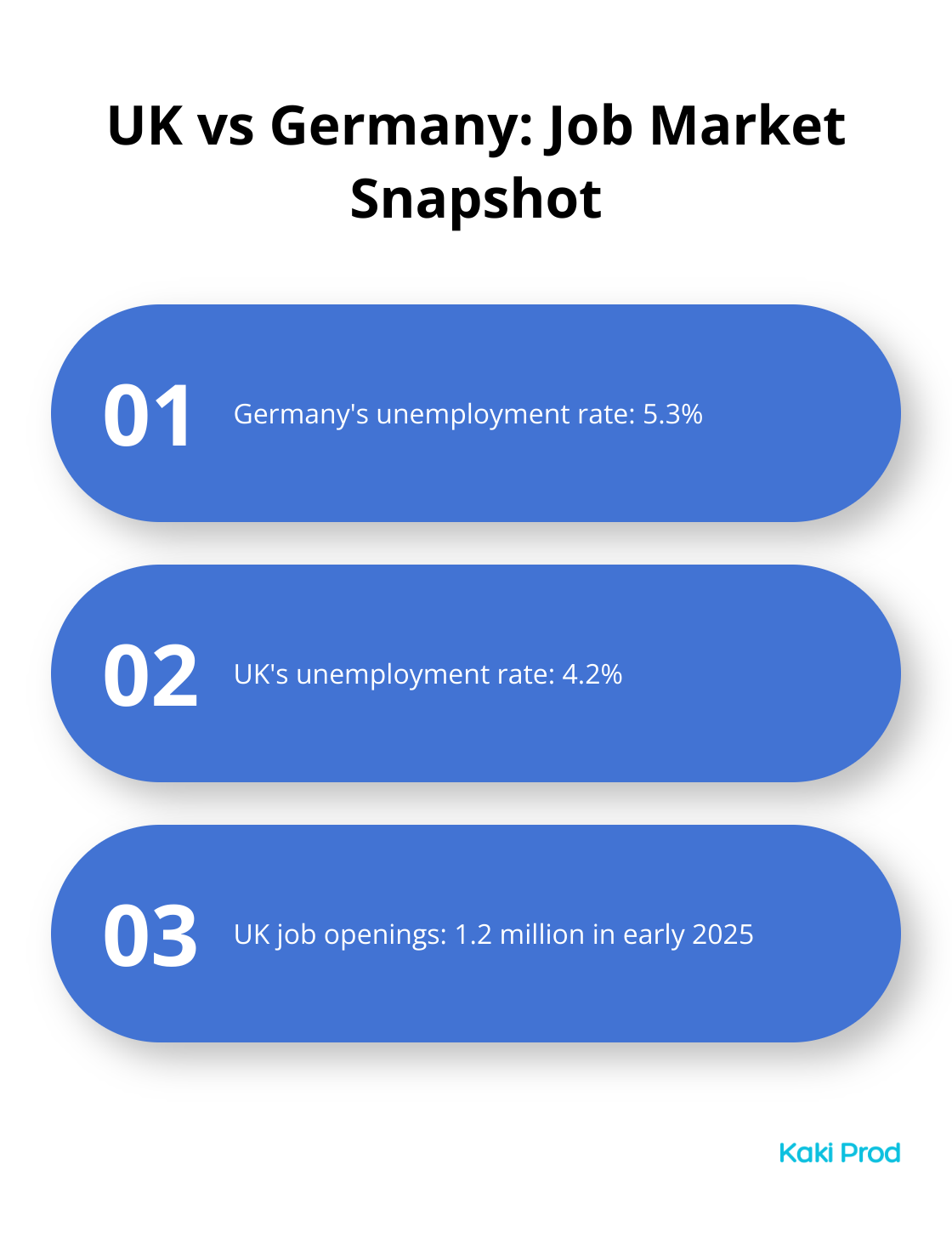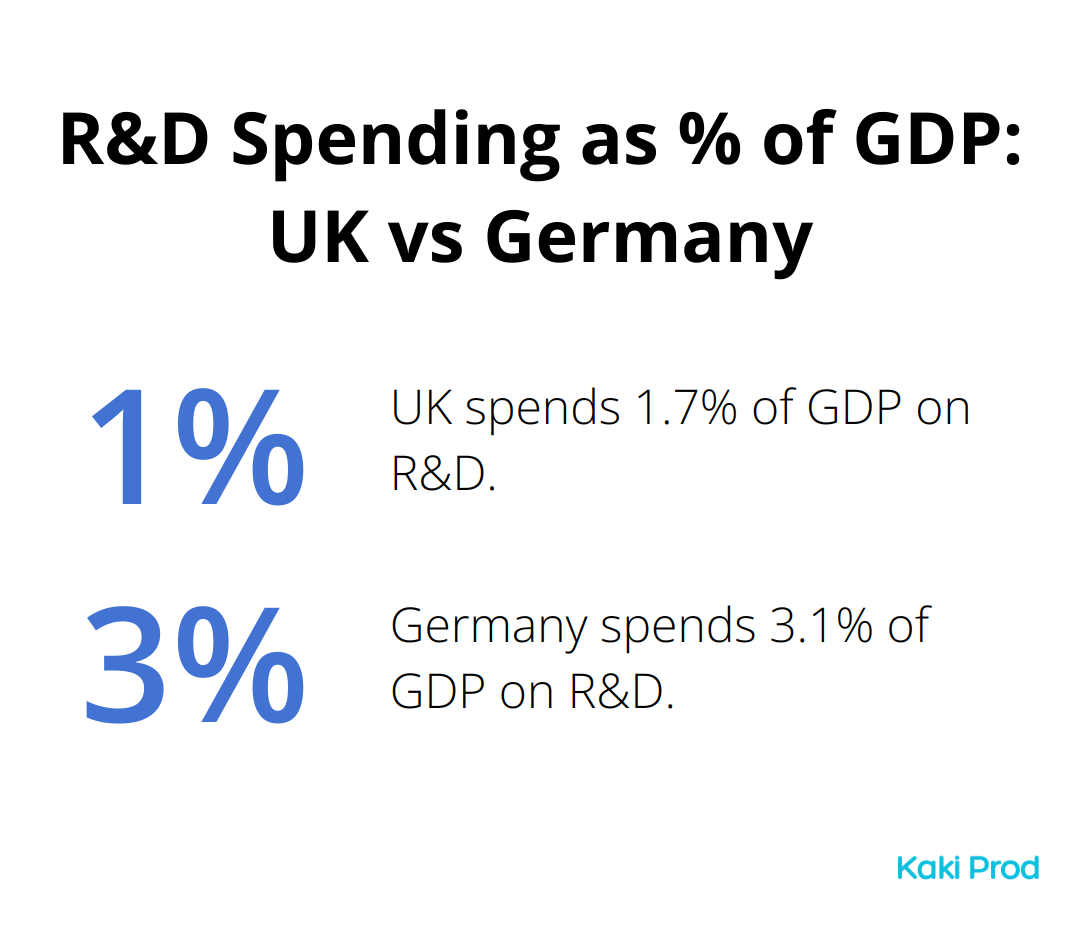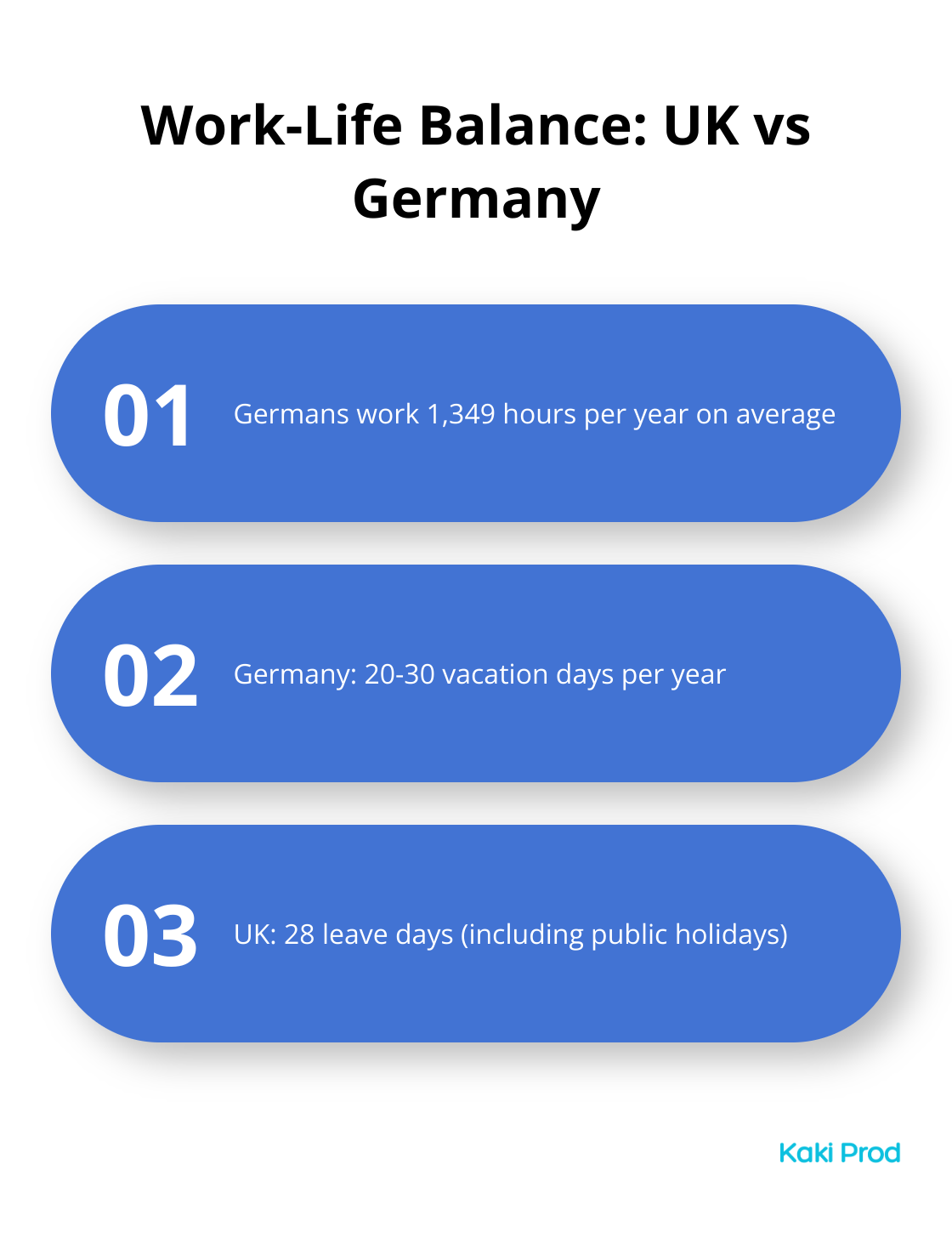Deciding between the UK and Germany for your next career move? It’s a big deal—really. Both places serve up their own sets of perks and headaches for those climbing the ol’ career ladder.
We’ve got the lowdown at Kaki Prod. We’re talking everything that could tilt the scales—economic vibes, quality of life, you name it.
This UK vs. Germany showdown? It’ll help you figure out which spot syncs up best with where you want your career—and life—to go. Make the call and get moving.
Economic Powerhouses: UK vs Germany
GDP and Growth: A Tale of Two Economies
Here we are-talking about the heavyweights of the European economy: the UK and Germany. Titans, really. Germany holds the powerhouse crown with an impressive GDP of around €3.8 trillion (as of 2023). Don’t sleep on the UK, though-it’s trailing close behind with £2.7 trillion in GDP muscle. But let’s not get lost in the numbers. They’re just part of the story. The UK’s economic growth forecast for 2025 has hit a speed bump, dropping from 1.6% to 1.1%-thanks, IMF. Those pesky tariffs and UK-specific issues are doing their share of meddling. The upshot? Germany might just be waving more job openings in the near future.
Job Market: Where Are the Opportunities?
Both these countries are squaring off like prizefighters in the job market ring. Germany’s got an unemployment rate floating around 5.3%, while the UK’s playing a bit leaner at 4.2%, according to Eurostat. Over in the UK, there’s been a boom-1.2 million jobs up for grabs early in 2025, says the Office for National Statistics. That’s a lot of doors opening for job hunters in the UK.

Germany’s doing its thing by bolstering the tech scene-IT, cybersecurity, you name it, they want it. With global R&D spending hitting record highs (almost US$ 1.7 trillion, if you can believe it), Germany’s tech and research sectors are sizzling with potential. The UK’s tech scene isn’t going to be left behind either. It employs a staggering 1.7 million people, pumping over £150bn into the economy every year. Throw in London’s financial sector allure, and it’s a magnet for global talent.
Salary and Living Costs: The Bottom Line
The paycheck showdown. UK workers bring home an average of £31,000 annually, while German workers average about €42,000 (thanks, OECD data). But don’t forget about living expenses-because cost of living can pack a punch. London is notorious for its sky-high expenses, while Berlin gives your wallet a breather-roughly 30% less monthly outgoings compared to London, as Numbeo reports. This means your euros might stretch further in Germany, and that alone might balance out those tempting UK paychecks.
Industry Focus: Strengths and Specializations
Germany isn’t messing around-it leans hard on manufacturing (a hefty 20% of its GDP). This focus churns out gigs in engineering and industrial domains. And they’re charging ahead with renewable energy targets-80% from green sources by 2030. This is where the green jobs and sustainable tech opportunities sprout up.
The UK, meanwhile, plays a different game with a more colorful job market. While tech and finance get a lot of love, creative industries, healthcare (shout out to the NHS), and education all hold their ground. The UK’s startup scene rocks, landing 4th place globally, with its fintech and health tech sectors snagging major investment.
So, which land of opportunity is calling your name? It really boils down to your field of expertise, career ambitions, and lifestyle needs. Whether it’s the UK or Germany, each offers its own distinct path for your future. The ball’s in your court.
Education and Skills: UK and Germany’s Unique Strengths
The UK and Germany-two educational heavyweights with distinct playbooks on learning. Their varied approaches? They send ripples (big ones) through career prospects for both homegrown and global talent.
Higher Education Powerhouses
The UK? A giant in higher ed. Student enrolments shot up by 44,360 from 2022/23 to 2023/24, especially at The Open University and De Montfort University. But here’s the kicker-pricey affairs. Domestic fees? £9,250 a year. International folks shell out up to £38,000. Yikes.
Germany plays a different hand. Public unis toss tuition fees out the window for everyone-any nationality, any background. Result? A wave of over 400k international students by 2021. Sure, only 23 German unis make the top 200 list, but they’ve got industrial ties and hands-on learning that pack a punch.
Vocational Training Excellence
Germany’s dual system? It’s magic. Cranking out skilled workers while keeping youth unemployment at bay. Over half the German students? They’re all in for vocational training. Highly skilled workforce and youth jobs sorted. Boom.
Now, the UK is trying to catch up. T-levels rolled out in 2020 to bridge the academic-tech gap. Slow going though-just 5,450 students jumped on board by 2022.
Research and Innovation Hubs
Both nations? Research titans. The UK splashes 1.7% of GDP on R&D, while Germany hits 3.1%. That sort of cash flow goes places.

Where? The UK’s all about life sciences. The Golden Triangle (London, Oxford, Cambridge) is where magic happens. Plus, it’s got Europe’s biggest tech playground, valued at a cool £1 trillion in 2023.
Germany? Engineering and applied sciences-where they shine. The Fraunhofer Society, Europe’s biggest research outfit, bridges the gap between books and business. Seventy-six institutes drive innovation in renewable energy and Industry 4.0. Not too shabby.
Language Barriers and Opportunities
Ah, language-a deal-breaker or a golden ticket. In the UK, English is king, and often all you need. But hang on-some gigs are open to those without it, especially at the lower pay levels.
Germany? Trickier. Some multinationals roll with English, but German’s often the key (especially customer-facing or smaller outfits). But flip side-polyglots are hot property. Language skills? They boost paychecks. Win-win.
Career Development Pathways
The UK dishes out a smorgasbord of career pathways-from classic corporate climbs to the vibrant startup scene. Its job market’s more flexible than a yoga instructor, easing shifts and pivots. Professional growth leans on soft skills and leading the charge.
Germany? They’re big on lifelong learning and getting that specialist flair. Many companies offer in-house training galore. Certifications and quals? They’re a big deal over there, pushing careers sky-high.
So, what’s it gonna be? The UK’s dynamic, ever-shifting job landscape or Germany’s methodical, specialized approach? Your educational chops, career dreams, and language game draw the map. Next, we’ll dive into how all this shapes up in quality of life and social perks in each country.
Quality of Life Showdown: UK vs Germany
Healthcare Systems: Efficiency and Accessibility
Germany’s healthcare system – think of it as a German-engineered automobile, running smooth and efficient. It’s all about universal coverage without the financial trauma. Low out-of-pocket costs and speedier treatments are the norm. Efficient? You bet.
Then there’s the UK’s NHS, which offers free care at the point of service. Brilliant – in theory. In practice? Those queue times might test your patience. If you’re heading to the UK and can’t wait, private insurance could be the ticket.
Social Security: A Safety Net Comparison
Ah, Germany’s social security system. It’s like a fortress – solid and reassuring. Unemployment benefits? Up to 60% of your previous net income for up to a year. And when you retire, there’s €1,543 per month waiting for you (2022 data). Safe and sound.
Now, the UK’s welfare system. It’s a bit more … reserved. Universal Credit comes in around £800 for singles per month. Pensions aren’t exactly a lavish affair either – £185.15 per week. It’s all relative and something to think about if you’re moving.
Work-Life Balance: Time Off and Working Hours
Germany nails work-life balance. Germans clock 1,349 hours a year. The law says 20 vacation days, but employers often bump it to 30. Nice.
The UK? Legally, you get 28 leave days (with public holidays). But the hustle, especially in London, can get… intense. Love your leisure time? Germany might be calling your name.

Cultural Diversity: Integration and Inclusivity
The UK – and London in particular – is like a world in a city. In 2021, 14.4% of the population was foreign-born. That means food, festivals, and plenty of cultures rubbing shoulders. It’s diverse with a capital D.
Germany’s catching up fast. In 2021, 26.7% had a migrant background. Berlin’s leading the charge for internationalism, though smaller towns might have you brushing up on your German.
Integration programs are there for you in both countries. Germany’s got courses for language and culture. The UK? Community initiatives, but less rigid.
Deciding between the UK and Germany is like picking between apples and oranges – it’s all about what you value. Prefer a secure benefit system and some downtime? Germany. Crave the buzz of diverse vibes and can handle the grind? The UK. Choose your adventure.
Final Thoughts
The UK vs. Germany debate-folks, it’s not about crowning a champ. Both these heavyweights have their own perks and quirks for the career-hungry and job wanderers. Germany? It’s got a powerhouse economy, a manufacturing machine, and they practically invented chill work-life harmony. The UK? A vibrant job scene, especially in tech and finance, plus it’s a melting pot of cultures.
When you’re deciding between these juggernauts, think about what makes you tick-career aspirations, favorite industries, and how you wanna live. And don’t forget: language skills, the price tag on living, healthcare vibes, and schooling options-they’re part of the package. Weigh these big-time, particularly if you’re thinking of packing up the family for the long haul.
At Kaki Prod, we’re all about giving you the lowdown to make these life-altering choices smoother. Our site dishes out career growth hacks and personal development goodies to get you where you wanna go. Check out our website to see how we can pave your path to smashing those career milestones in the UK, Germany, or even farther afield.

